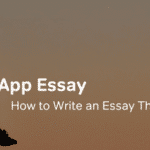
A great college essay topic is meaningful and engaging. It tells a story only you can tell, in a way that only you can tell it. It reveals something important about who you are, how you think, or what you believe in and value. But what about a not-so-great college essay topic? Are there any college essay topics to avoid entirely?
The short answer is: Yes. For example, you don’t want to write anything that casts you in a negative light, risks upsetting the person reading your essay, or touches on a cliché and overused topic. Keep reading to learn more about the seven topics you should never write about in your college essay.
Top 7 College Essay Topics to Avoid
1. Illegal/Inappropriate Behavior
In very rare cases, it might be appropriate to tell a story that shows how much you’ve changed and grown as a person. For the most part, however, it’s better to avoid discussing any illegal, immoral, or inappropriate behavior in your essay. And when in doubt, it’s best to leave it out.
So, don’t write about underage drinking, drugs, trespassing, stealing, risky behaviors with your friends, or any major personality flaws. Don’t glorify violence or write about experiences that might make your reader uncomfortable. Similarly, avoid profanity and graphic language.
You don’t know who’s reading your essay or how they might feel about these topics. There’s a good chance they might question your character, along with the wisdom of offering you a place on campus.
2. Overused Ideas
When applicants write about cliché or overdone topics, it’s hard to offer anything new to your reader. And when you don’t offer anything new, admissions officers don’t get a chance to learn more about you. It also means that your essay won’t be particularly memorable.
Here are common topics that you should avoid:
- Highlights of a sports career
- A sports injury
- Family history in a career field
- Performing well in a challenging class
- Overcoming divorce or the death of a pet
- Starting your essay with a famous quote
- Moving to a different part of the country
- Volunteering
- Volunteer trips/traveling (especially how you realized everything you have to be grateful for)
- Religious background
- Romantic relationships
- Using a common object as a metaphor for you or your life
That’s not to say that none of these topics can be done well. You might be able to find a really creative approach to some of the topics listed here. For instance, the experience of divorced parents is common, but maybe you dealt with it in a unique way. To stay on the safe side, it’s still better to explore a different idea that will seem fresh to admissions officers and give deeper insight into your personality and individuality.
3. Hot-Button Issues
Controversial topics like politics, religion, and other hotly debated subjects and current events are not ideal for your college essay. For example, don’t get into your views on abortion, guns, immigration, police officers and the justice system, or the current president.
If you’re deeply passionate about or personally affected by some of these topics, it makes sense that you might feel compelled to write about them—but it’s still safer not to.
Again, you don’t know who is reading your essay or where they stand on these hot-button issues. You simply don’t want to risk offending or alienating the person who decides whether you get into the college of your choice.
Here’s a helpful rule of thumb: If posting about it on social media would start an argument, don’t write about it in your college essay.
4. List of Accomplishments
The person reading your essay has already seen your GPA, test scores, and your resume of activities and achievements. Your essay is your chance to reveal something new about who you are as a person. So, don’t rehash a list of your accomplishments or bore the admissions officer with something they already know about you.
Plus, admissions officers don’t want to read an essay full of bragging and overconfidence. It’s better to focus on an obstacle, a moment of doubt, or a mistake that you learned from. Stories of overcoming and growth tell a lot more about you than a story in which you’re the flawless hero.
Remember, too, that most applicants have a similar list of accomplishments. They have also scored winning goals, starred in plays, aced the hard class, and volunteered to tutor younger kids or serve meals at a soup kitchen. This doesn’t mean you shouldn’t be proud of your accomplishments, but it means that your accomplishments do not make you who you are. And who you are is what admissions officers want to learn about in your essay.
5. Anything Untrue/Inauthentic
Since admissions officers want to get to know you, the last thing you should do in a college essay is lie or try too hard to impress. Your real, authentic voice should shine through. You should be honest, vulnerable, and memorable.
You might think your reader won’t notice if you lie, but it’s often more obvious than you might expect. And they will definitely pick up on it if you try too hard to use impressive vocabulary words or say what you think they’d like to hear. After all, you’ll end up sounding like a lot of other applicants, and your essay will be stiff and dull instead of interesting and authentic.
If you feel like you don’t have anything exciting to write about, don’t worry. Some of the best and most memorable college essays are about small moments that held significance to the writer—like essays about fly fishing, a family’s dining room table, or a student’s commute to and from school each day. Write about something true that matters to you, in your own voice. It’s really that simple!
6. Over-the-Top Humor
If being humorous is naturally part of your personality, it’s fine to include a well-placed joke or two in your essay. But natural is the key here. Don’t try to force humor, and don’t make humor the main theme of your college essay.
Often, humor doesn’t come across well in writing, especially to a reader who doesn’t know you. Admissions officers might find your “funny” essay forced and unamusing. Satire and sarcasm are also best avoided.
7. Topics That Don’t Focus on YOU
Finally, your essay is supposed to give deeper insight into you—your personality, your beliefs and values, and what has shaped you into the person you are today. It’s OK to briefly talk about other people or places in the context of how they have influenced you, but try not to overly focus on:
- Your hero
- A relative who has inspired or influenced you
- A famous book, painting, or quote that you love
- An issue or current event and how you would fix it
- The work, performance, or life of another person
Since you are the topic of your college essay, writing too much about the subjects above feels off topic and irrelevant. Again, you can briefly touch on these subjects, but quickly segue into what you have learned or how you have been impacted as a result. It’s your college essay, and you’re the star of the show!
Bonus: A Few Other College Essay Topics to Avoid
Here are a few other miscellaneous topics and errors to avoid as you begin writing:
- Poetry: Like humor, it often falls flat.
- Going too out-of-the box: Writing something super creative and experimental, or a meta essay along the lines of “you’re reading my essay right now,” is risky.
- Whining or making excuses: If you write about a challenge, focus on how you overcame it and what you learned as a result. Avoid sounding whiny or making excuses. You also don’t want to sound pessimistic or cynical.
- Insulting anyone (e.g., a teacher you didn’t like, a peer who wasn’t your favorite)
- Talking down to the reader
- Spelling the college’s name wrong (or using the wrong college’s name)
- Saying anything negative about the college
- Vague, generic details
- Lack of personality
- Using too many “fancy” words that don’t sound like you
- Using repetitive words and phrases
This probably isn’t an exhaustive list, but use common sense as you brainstorm your essay topic, write, and proofread your essay. Put yourself in the shoes of a tired college admissions officer who has read hundreds of essays, maybe even thousands. What would you want to read? What would you not want to read?
Remember that you don’t know a lot about this person—their opinions, their values, their beliefs—so don’t risk upsetting them. After all, they have a major say in whether you get into this college. Once again: When in doubt, leave it out!
Final Thoughts on College Essay Topics to Avoid
When it comes to choosing a topic for your college essay, the possibilities are almost endless. But there are a few guidelines you should follow if you don’t want to upset, offend, or bore the reader of your essay:
- Don’t write about anything illegal, potentially inappropriate, or overly controversial.
- Humor is fine, especially if that’s a big part of your personality, but don’t be over the top.
- Try not to write the same essay that your admissions officer has already read hundreds of times.
- Don’t rehash information that appears elsewhere in your application.
- Make sure that you are the focus of your essay, and be honest and authentic.
Avoid these topics in your college essay, and you’ll be well on your way to writing something that admissions officers will love! Looking for more tips on how to write a great college admissions essay? Check out our previous guide on how to stick to the word count on college essays!






Leave a Reply